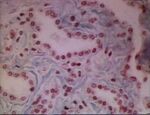Diffuse Fibrosing Alveolitis
Jump to navigation
Jump to search
Diffuse Fibrosing Alveolitis/ Interstitial Pneumonia
- Diffuse inflammatory process which occurs distal to the terminal bronchioles
- Characterised by thickening and fibrosis of the alveolar walls
- The precise underlying aetiology of this condition is obscure and it is likely to represent the end stage of a variety of initial insults including EAA and fog fever
- Progression from an acute exudative phase through a proliferative phase (proliferation of type II pneumocytes) to a final irreversible stage of fibrosis is the hallmark of DFA
- The rate of the ensuing fibrosis is heavily dependant on the intensity of the inflammation associated with it
- Underlying pathogenesis of the fibrosis is complex and involves a relative increase of type I collagen fibres (dense, high tensile strength) over type III fibres (reticulin)
- Stimulation of fibroblast proliferation and collagen deposition are thought to be induced by macrophage derived cytokines, e.g. IL-1, TGFalpha and TGFbeta, GM-CSF
- Chronic disease of adult cattle occuring sporadically
- Probably caused by repeated subclinical incidents of fog fever or farmer's lung
- Farmer's Lung
- Extrinsic allergic alveolitis
- Hypersensitivity of ingested or inhaled moulds
- May occur as an outbreak or sporadically in adult cattle
- Hypersensitivity diseases often cause an lymphocytic interstitial pneumonia
- Chronic interstitial pneumonia progresses to fibrosis
- Sometimes called pneumonitis
